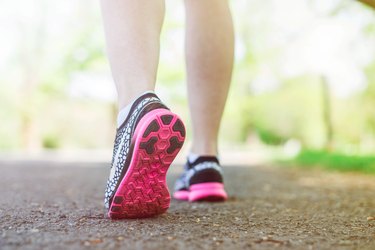
It's common to experience some swelling of your hands, feet and lower legs during and immediately after exercise. These symptoms are known as edema. This is especially true during hot weather, during pregnancy and after eating salty foods, which increases water retention. Without other symptoms, especially pain, and if the swelling disappears within 24 hours, don't worry. A few self-care steps can help. But if edema persists, see your doctor right away.
Swollen Hands and Fingers
Video of the Day
It's not completely understood why hands swell during exercise, according to the Mayo Clinic, but the theory is that it's a side-effect of how your body and blood vessels respond to increased energy demands on muscles during exercise. During exercise, blood flow increases to muscles as well as your heart and lungs. This sudden shift reduces blood flow to your hands, which cool down.
Video of the Day
Blood vessels in your hands overreact, opening wider, which causes fluids to concentrate. With continuing exercise, your muscles generate heat and blood is pushed closer to the skin surface, to dissipate heat through perspiration, which might also contribute to swollen hands.
Leg Swelling From Walking
Long walks or otherwise being on your feet or sitting for a long time, eating salty foods and hot weather can also cause edema of the legs and feet. Painless swelling of the feet and ankles is also fairly common among older adults or people with overweight and can sometimes affect calves or legs. Sometimes feet can swell in hot weather, too, called heat edema.
According to the University of Maryland Medical Center, leg swelling occurs when excess fluid from the blood accumulates in the leg muscles and soft tissues. This condition is known as peripheral edema.
Treating Edema at Home
Swollen ankles and feet from walking often occurs among people who don't exercise regularly. The problem might largely resolve itself once walking becomes routine. But until then and during hot weather, remove your rings and take off your watch before setting out.
To minimize hand swelling while you're walking, occasionally extend your arms and do forward and backward arm circles and also stretch your fingers and make fists to enhance circulation. For leg, ankle and foot swelling, lie down when you get home and elevate your feet above your heart for 30 minutes, to encourage fluid return toward the heart with a little help from gravity. Also lift your arms above your heart if your hands are swollen too.
When to Seek Help
Edema that causes swollen legs can be a symptom of various serious conditions, including leg infection, a blood clot in the leg, heart failure, kidney failure, liver failure, and pre-eclampsia or toxemia in pregnant people. MedlinePlus urges calling 911 if you have edema and feel short of breath, or have chest pain, pressure or tightness.
Call your doctor if you have a fever, if you experience more than mild swelling or if swelling continues to increase, and if your swollen foot or leg turns red or feels warm to the touch. Some medications, including calcium channel blockers for high blood pressure, can cause edema, so let your doctor know whether symptoms seem related to a medication change.